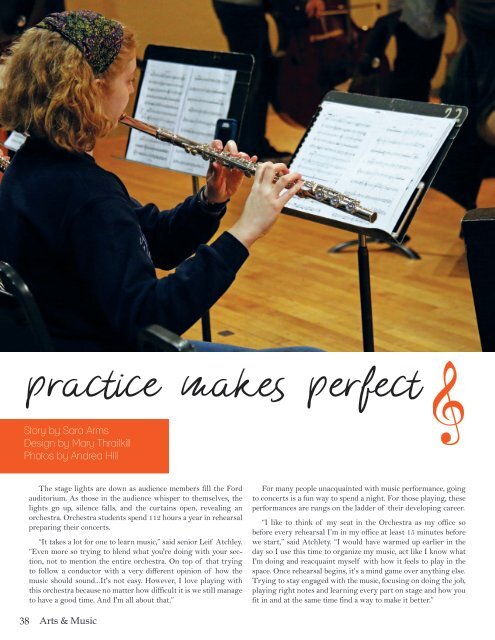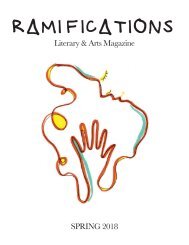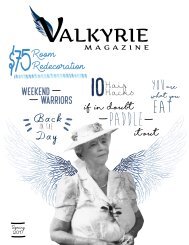You also want an ePaper? Increase the reach of your titles
YUMPU automatically turns print PDFs into web optimized ePapers that Google loves.
practice makes perfect<br />
Story by Sara Arms<br />
Design by Mary Thrailkill<br />
Photos by Andrea HIll<br />
The stage lights are down as audience members fill the Ford<br />
auditorium. As those in the audience whisper to themselves, the<br />
lights go up, silence falls, and the curtains open, revealing an<br />
orchestra. Orchestra students spend 112 hours a year in rehearsal<br />
preparing their concerts.<br />
“It takes a lot for one to learn music,” said senior Leif Atchley.<br />
“Even more so trying to blend what you're doing with your section,<br />
not to mention the entire orchestra. On top of that trying<br />
to follow a conductor with a very different opinion of how the<br />
music should sound...It's not easy. However, I love playing with<br />
this orchestra because no matter how difficult it is we still manage<br />
to have a good time. And I'm all about that.”<br />
38 Arts & Music<br />
For many people unacquainted with music performance, going<br />
to concerts is a fun way to spend a night. For those playing, these<br />
performances are rungs on the ladder of their developing career.<br />
“I like to think of my seat in the Orchestra as my office so<br />
before every rehearsal I’m in my office at least 15 minutes before<br />
we start,” said Atchlety. “I would have warmed up earlier in the<br />
day so I use this time to organize my music, act like I know what<br />
I'm doing and reacquaint myself with how it feels to play in the<br />
space. Once rehearsal begins, it’s a mind game over anything else.<br />
Trying to stay engaged with the music, focusing on doing the job,<br />
playing right notes and learning every part on stage and how you<br />
fit in and at the same time find a way to make it better.”<br />
Playing in the orchestra provides students with experience in<br />
a potential career path. It allows them to work as a group guided<br />
by Dr. Eric Hanson enabling them to gain, as Atchley puts it,<br />
“another chance to practice doing what I love. So much of becoming<br />
a ‘professional’ in any field is quantity of quality practice.<br />
Regardless of the music we happen to be playing, I'm carrying<br />
myself as if I’m sitting principal trumpet with the New York<br />
Philharmonic! One note has the power to change someone's life<br />
with the right intent and motivation behind it.”<br />
Across campus, theatre students are rehearsing an upcoming<br />
show. 100 hours of rehearsal will go into this show (totaling 400<br />
hours of rehearsals a year), not including the same amount of<br />
time taken to building set pieces and making props. What audience<br />
members don’t realize when seeing a staged performance is<br />
that that particular moment has been rehearsed for weeks, and,<br />
for bigger productions, perhaps months.<br />
There is no such moment as the second before the lights go up<br />
on the stage opening night. Backstage, crew members hold their<br />
breath, listening as the first line, first scene, first act fly by. After<br />
the first curtain call, as crew members mop and care for the set<br />
and actors put away their props, costumes and makeup, a sense<br />
of shared euphoria, an adrenaline-induced giddiness, wash over<br />
everyone. The bustle calms down and everyone passes through<br />
the greenroom by 11pm, grabbing their backpacks and heading<br />
to the library to study or, if they’re lucky, to their rooms to sleep.<br />
Any music and theatre student will tell you—it is worth it.<br />
39














